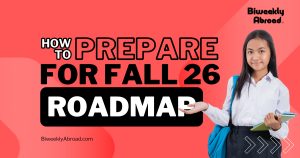How to Write a Compelling Gap Year Essay That Stands Out
Taking a gap year has become an increasingly popular choice for students worldwide. Whether it’s about gaining cultural exposure, building skills, or exploring passions, a gap year can be transformative. However, the real challenge lies in translating this experience into a powerful essay that resonates with college admissions officers, scholarship panels, or even personal readers.
In this guide, we’ll help you craft a gap year essay that not only stands out but also reflects your personal growth, vision, and readiness for the next stage of life.

The Purpose of Your Gap Year Essay
A gap year essay is more than just a narrative of where you went and what you did. It’s a reflection of your personal transformation, cultural understanding, and future aspirations. Admissions officers want to see how your experiences have shaped you and how they align with your academic and career goals.
Done right, your essay can make you memorable, showcasing the depth of your experiences and the clarity of your ambitions.
How to Structure Your Gap Year Essay
A strong structure is key to keeping your reader engaged. Here’s a step-by-step outline to guide your writing:
1. Start with a Hook That Captivates
Begin with an attention-grabbing moment from your gap year. This could be a vivid anecdote, a surprising realization, or even a moment of challenge.
Example:
“Standing in the middle of a Kenyan savanna, I held a newborn lion cub for the first time. It was a surreal moment that taught me about the delicate balance between humanity and nature—an experience that would redefine my future.”
Your hook should set the stage for your narrative while sparking curiosity.
2. Provide Context
Briefly explain your decision to take a gap year and what you aimed to achieve. This section connects your journey to your personal or academic goals.
Example:
“I chose to take a gap year not to escape academics, but to deepen my understanding of global conservation efforts. For years, I dreamed of studying wildlife biology, but I wanted to experience it firsthand before committing to this path.”
3. Focus on Key Experiences and Personal Growth
Highlight 2-3 transformative moments during your gap year that had a profound impact on you. For each, describe:
- What happened
- How it challenged or inspired you
- What you learned
Example:
“Volunteering at a rural school in Nepal taught me more than just how to teach English; it taught me patience and the importance of connection. Initially, I struggled to bridge the cultural and language gaps. Over time, I learned how to adapt my teaching style, ultimately building trust and forming bonds that transcended language.”
Be specific and descriptive—show, don’t tell.
4. Connect the Dots to Your Future
Admissions officers want to know how your gap year prepared you for the next phase of your journey. Tie your experiences back to your academic and career goals.
Example:
“My time working on sustainable agriculture in New Zealand solidified my passion for environmental science. It gave me practical insights into renewable farming practices, which I now plan to explore further through my studies and eventual career.”
5. End with a Thoughtful Conclusion
Your conclusion should bring the essay full circle, tying your experiences back to the opening while leaving a lasting impression.
Get Top University Tips Twice a Week!
- ECA Breakdown and Step-by-Step Guides
- Internship Program Opportunity
- Dream University Admission: How Top Students made it
- Essay Crafting Secrets with Successful Essays
🔒 This content is exclusive to subscribers. Enter your email to access the full blog and more tips!
We respect your privacy. Unsubscribe at any time.
Example:
“As I prepare to start college, I carry with me the lessons learned during my gap year: resilience, curiosity, and a profound respect for the interconnectedness of our world. My journey was more than a year off—it was the year that prepared me for a lifetime of learning and impact.”
Writing Techniques That Make Your Essay Stand Out
Be Authentic
Write in your voice. Authenticity is far more compelling than forced eloquence. Share personal anecdotes and reflections that reveal who you are.
Be Specific
Instead of vague descriptions, use concrete details to paint a vivid picture.
Instead of:
“I traveled to many countries and learned about different cultures.”
Write:
“In Morocco, I learned the art of patience while haggling in vibrant souks, where every purchase became a dance of negotiation and cultural exchange.”
Show, Don’t Tell
Illustrate your growth through actions and realizations.
Instead of:
“I became more independent.”
Write:
“Navigating public transport in a foreign country without speaking the language taught me to trust my instincts and adapt quickly to unfamiliar situations.”
Common Pitfalls to Avoid
- Avoid a Travel Diary: Focus on personal transformation, not just the itinerary.
- Don’t Oversell: Be honest about challenges as well as successes—it makes you relatable.
- Stay Away from Clichés: Phrases like “finding myself” or “changing the world” can feel overused unless backed by unique, specific examples.
Polishing Your Essay
Edit for Clarity and Impact
- Trim unnecessary words or sentences.
- Use smooth transitions between ideas.
- Make every paragraph serve a clear purpose.
Get Feedback
- Share your draft with a teacher, mentor, or peer.
- Ask someone unfamiliar with your gap year to review it—they’ll catch unclear points.

Gap Year Essay Examples
Sample Gap Year Essay (Example 1)
Introduction:
“The 4 a.m. call to prayer echoed through the streets of Amman as I prepared for another day teaching English to refugee children. Their resilience, despite unimaginable hardship, was humbling and sparked a realization: education isn’t just a tool for learning—it’s a lifeline.”
Body:
“My decision to take a gap year stemmed from a desire to bridge the gap between education and accessibility. Working at a refugee center in Jordan, I encountered stories of perseverance that challenged my preconceptions. These experiences shaped my goal of pursuing international education policy.”
Conclusion:
“My gap year wasn’t just a year of travel; it was a journey of self-discovery and purpose. It prepared me to approach college with a global perspective and a commitment to making education accessible for all.”
Sample Gap Year Essay 250 words (Example 2)
Introduction
“The scent of lavender filled the air as I worked alongside farmers in Provence, France, harvesting under the golden sun. My hands, stained purple from the fields, reminded me that learning doesn’t always happen in classrooms—it can happen in the heart of a community.”
Body
_”During my gap year, I immersed myself in sustainable agriculture. On a small farm in Provence, I learned about eco-friendly farming practices, crop rotation, and the deep cultural significance of food. Sharing meals with local farmers taught me the importance of community and tradition.
Later, I volunteered with an urban farming project in Ho Chi Minh City, Vietnam. Adapting to the hustle of city life, I worked on green initiatives that tackled food security and climate challenges. This transition—from rural Europe to urban Asia—broadened my perspective, teaching me to approach global problems with a local mindset.”_
Reflection
“My gap year wasn’t just about farming; it was about growth. I became more adaptable, resilient, and open to new ideas. I learned to navigate language barriers, embrace discomfort, and find joy in challenges.”
Conclusion
“As I prepare to study environmental science, I carry the lessons of my gap year: the value of sustainability, the power of community, and the importance of experiential learning. This year wasn’t a break; it was the foundation for my future.”
Final Tips for Success
- Start early to allow time for multiple drafts.
- Be genuine—your unique perspective is your strength.
- Use specific examples to illustrate your growth.
- Proofread thoroughly—errors can distract from your message.

Conclusion
A gap year essay is your chance to showcase how stepping away from academics enriched your personal and professional outlook. By focusing on personal growth, using specific anecdotes, and tying your experiences to future goals, you can craft an essay that resonates with readers and leaves a lasting impression.
Your gap year isn’t just a chapter in your life—it’s a story worth telling. Make it count!
If you have any additional questions, feel free to ask in the comment section below, and we will respond promptly. Alternatively, if you encounter any issues during the application process, you can message us on our Facebook page, “Biweekly Abroad“ and we will do our best to assist you. Good luck! 🎉
To get more exciting content about study abroad Subscribe to our newsletter Biweekly Abroad.





